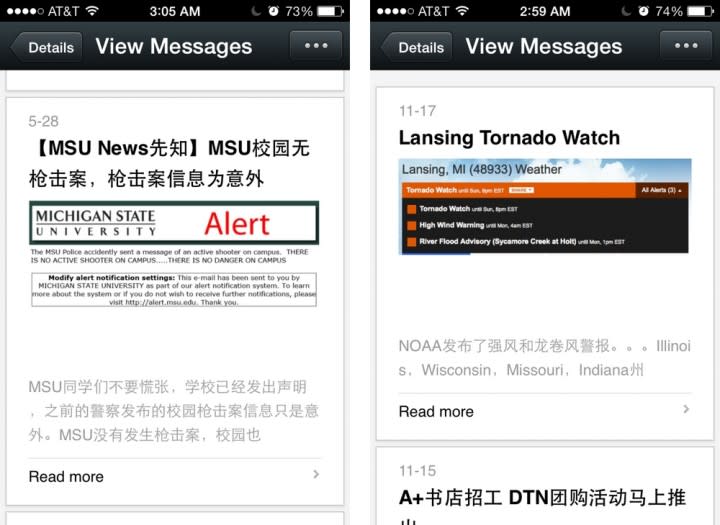Tornado spotting and partying: how WeChat is being used by US colleges
Ken is a co-founder of diaspora-focused startup CultureMesh. He is based in Silicon Valley and is primarily interested in the use of Asian technology products outside of Asia – or by minority populations within Asian countries.
On November 17, the WeChat account MSU伴侣 (literally “MSU Companion”) warned overseas Chinese students about the possibility of tornadoes and severe winds near Michigan State University’s campus in East Lansing. Earlier this year, the school also used WeChat to calm students’ nerves about a reported shooter on university grounds (pictured below).
While there were fortunately neither tornadoes nor gunmen, WeChat was able to facilitate timely Chinese-language emergency communications in a Midwestern American college town.
Besides urgent notifications, students who subscribe to this particular account (i.e. a brand page, just like Facebook has) can hear about cultural events, group outings, parties, and the occasional post about local car insurance rates.
For an insider’s perspective on using WeChat in this way, I talked to Chinese students and recent graduates at my alma mater, where Chinese students make up roughly 12 percent of this year’s freshman class.
“It’s a good reminder of important events and deadlines, and particularly helpful to new students,” said Wenxin Zhang, a Chinese student and East Lansing resident. “Even as an upperclassman, I like the updates that show me where I can go for a resumé workshop or career fair.”
Several students mentioned that even more MSU WeChat pages have launched since the May 15 debut of MSU伴侣, and one recent grad, Linglong Wei, said that these accounts inside the popular messaging app – which has 272 million active users around the world – have inspired her to employ her own branded page strategy. “After graduation, I started an agriculture e-commerce company focused on Sino-American trade, and now I’m planning to use WeChat as one of my key marketing channels,” she said.
(See also: Teenagers say goodbye to Facebook, adding street cred to WeChat)
WeChat connects alums in China too
WeChat messages from MSU alert students to dangers.
Meanwhile, in China, a new MSU alumni subscription account launched this week, further embedding university branding into the fabric of the Chinese internet.
In August, I wrote about an alumni experiment with WeChat groups, spearheaded by Dan Redford of the MSU Beijing Alumni Club. But this new WeChat account, MSUSHALUMNI, was instead put forth by alumni in Shanghai.
Although WeChat groups allow chat room-style discussion among all members, they’re invite only, and max out at 40 participants. WeChat brand accounts, on the other hand, lack back-and-forth dialogue, but anyone can search for and join a page, and subscriber numbers are unlimited.
To shed more light on this new trend in higher education, I spoke to Shanghai resident and Michigan native David Gross, who helps coordinate MSU alumni efforts in the Greater China region.
“The original goal in starting this up is to get the word out about a signature holiday event we’re hosting on December 28,” Gross explained. “We’ve been able to measure our effectiveness in terms of RSVPs over the last several years, starting with 12 RSVPs two years ago, 18 last year, and now 62 this year.”
While the more established Mainland alumni clubs are in Beijing and Shanghai, Gross is working toward jumpstarting clubs in other Chinese cities, who may also begin to establish themselves on WeChat.
Zichao Wan, the Shanghai club’s membership manager, set up the WeChat subscription account and, after the upcoming holiday party, plans to leverage it toward “increasing membership, spreading information, and coordinating events.”
The entire process, from contacting WeChat, to registering the account under his identity, and opening the account, took exactly seven business days, Wan said.
(Editing by Steven Millward)
The post Tornado spotting and partying: how WeChat is being used by US colleges appeared first on Tech in Asia.


